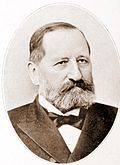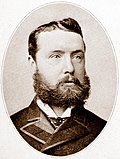Background
Beginning with the election of Hugh J. Grant in 1888, Tammany Hall and boss Richard Croker had dominated New York City politics. Despite 1890 hearings in the New York Senate which uncovered evidence of bribery and corruption, Tammany won large majorities in the 1890 and 1892 elections.
In 1894, a more aggressive Senate investigation chaired by Clarence Lexow publicized New York Police Department corruption, bribery, and complicity in prostitution rings under police chief Bill Devery. During the hearings, Croker fled the country to Europe and Devery feigned an illness to avoid criminal prosecution. The Lexow Committee ultimately published over 10,000 pages of testimony, uncovering an institutional system of "extortion, bribery, counterfeiting, voter intimidation, election fraud, brutality, and scams" with direct involvement and leadership by high-ranking Tammany Hall members. [1] [2] In response, Mayor Gilroy appointed a bipartisan board of police directors, but his popularity had sunk, and he did not stand for election to a second term. [1]
In addition to the Tammany and police corruption scandals, the national fiscal depression dampened support for the incumbent Democratic Party in cities across the country.
This page is based on this
Wikipedia article Text is available under the
CC BY-SA 4.0 license; additional terms may apply.
Images, videos and audio are available under their respective licenses.


